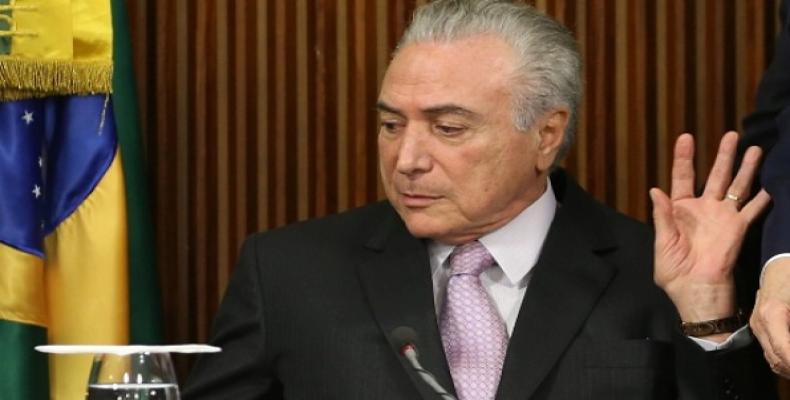Brasilia, April 5 (RHC)-- A Brazilian court began proceedings on Tuesday over illegal election campaign financing that could unseat unelected President Michel Temer less than one year after he was installed as head of state through a parliamentary coup against his predecessor Dilma Rousseff.
The country's top electoral court, known by its Portuguese acronym TSE, will hear the case related to accusations of illicit funding in Temer's campaign when he was Rousseff's running mate in her successful 2014 bid for re-election.
Temer's right-wing PMDB party was formerly in a coalition with Rousseff's Workers' Party, also known as the PT, before a rupture last year that helped pave the way for the controversial and ill-footed impeachment process, widely condemned as a parliamentary coup. Temer, then Rousseff's vice president, became a key backer in ousting Rousseff, aligning more closely in the process with the conservative PSDB, which lost the 2014 election to Rousseff and is ironically behind the complaints filed with the TSE.
After the TSE recognized Rousseff and Temer's win in 2014 against PSDB candidate Aecio Neves and his running-mate Aloysio Nunes, who is now Temer's foreign minister, the PSDB filed complaints to reopen the legitimacy of the election victory, alleging irregularities in campaign financing linked to the corruption scheme in the state-run oil company Petrobras.
The outcome of the trial could annul the results of the 2014 election, but justices could also rule to throw out the case since Rousseff is now longer in office. Both Temer and Rousseff are involved in the case and deny the allegations. Their defense teams will make their cases in the coming days.
Despite being ousted in a process her rivals painted as a bid to root out government corruption, Rousseff has not been accused of personal enrichment or financial impropriety but rather was impeached on the basis that she cooked the books with common accounting tricks ahead of her re-election campaign.
Temer, on the other hand, is a target in Brazil's central corruption investigations known as Operation Car Wash and has already been found guilty of breaking election financing laws in a regional election court in São Paulo. As a result of the case, the sitting president has been banned from running for office for eight years — a fact that did not prevent him being installed as president last year.
It is expected that Temer's defense will attempt to stall the trial as much as possible in attempts of postponing the conclusion until the 2018 presidential election to avoid being booted from office early. His ally Eduardo Cunha — also a member of the PMDB party and a former speaker of the lower house of Congress who was the chief architect behind Rousseff's ouster and was recently sentenced to 15 years on corruption charges — was notorious for using stall tactics when he faced suspension last year, dragging out the process for months.
At the beginning of the trial, TSE rapporteur Judge Hernan Benjamin noted that the case has already been pending for about two and a half years and urged the court to "avoid procrastination" and "expedite" the process with this fresh trial.
"The 2014 election will be known as the longest in Brazilian history, closing the ballot boxes and counting the votes, but the result is being discussed through the judicial process," he said, according to Brazilian daily Folha de S. Paulo.
Benjamin has prepared a more than 1,000-page report on the case. Judges can request time to study the report during the proceedings, which could drag out the trial for days or even months. TSE Judge Gilmar Mendes said last week that it is not yet clear how long the trial will take.
The trial comes as serious corruption allegations continue to swirl around Temer's government as several top allies are implicated in fraud schemes linked to Petrobras and Brazil's largest construction conglomerate, Odebrecht, which is under investigation together with dozens of officials in different countries for running an international bribery network.
Brazilian Court Launches Trial to Oust Temer from Office Over Illegal Campaign Funds


